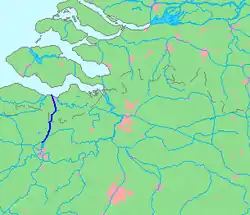Ghent–Terneuzen Canal
The Ghent–Terneuzen Canal (Dutch: Kanaal van Gent naar Terneuzen), also known as the "Sea Canal" (Zeekanaal) is a canal linking Ghent in Belgium to the port of Terneuzen on the Westerschelde (Scheldt) estuary in the Netherlands, thereby providing the former with better access to the sea.

| Ghent–Terneuzen Canal | |
|---|---|
 Map of the canal region | |
| Specifications | |
| Length | 32 km |
| Maximum boat length | 265 m (869 ft) |
| Maximum boat beam | 34 m (112 ft) |
| Minimum boat draft | 12.50 m (41.0 ft) |
| History | |
| Construction began | 1823 |
| Date completed | 1827 |
| Geography | |
| Start point | Ghent, Belgium |
| End point | Westerschelde (Scheldt) At Terneuzen, Netherlands |
History
The canal was constructed between 1823 and 1827 on the initiative of the Dutch King: Belgium (as it subsequently became) and the Netherlands had become a united country under the terms agreed at the Congress of Vienna. After Belgium broke away in 1830, traffic to and from Belgium was blocked by the Dutch until 1841.
Between 1870 and 1885 the canal was enlarged to a depth of six and a half meters at its centre, and to a width of 17 meters at its base and 68 meters at the surface level: bridges were rebuilt accordingly along the Belgian sector.
The famous Cluysen - Ter Donck Regatta was organised here for many decades (1888-1954) and during the 1913 Expo of Ghent the European Rowing Championships took place on the canal.
Further development and major enlargement took place during the subsequent century, most notably during the early 1960s.
In February 2015 Flanders and the Netherlands signed a treaty for the construction of a new lock at Terneuzen, scheduled for completion in 2021 and costing €920M.[1] The new lock is about the same size as those of the contemporaneous expansion project of the Panama Canal.[1]
Today

Today the Ghent-Terneuzen canal is 200 meters wide and 32 kilometers (20 mi) long, capable of accommodating ships of up to 125 000 gross tonnage. The largest permitted vessel size has increased, correspondingly, to 265 meters long x 34 meters wide, with a draft up to 12.5 meters.
References
- Tony Slinn (6 February 2015). "Ghent to build $1Bn Terneuzen lock". IHS Maritime 360. IHS Inc. Archived from the original on 23 April 2015. Retrieved 2015-04-23.
External links
| Wikimedia Commons has media related to Ghent–Terneuzen Canal. |
- Portaal van Vlaanderen (in Dutch)